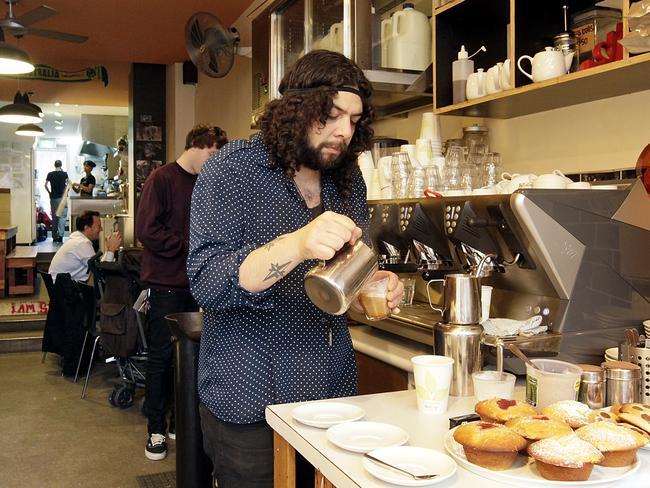Push on to wipe out double time for cafe, restaurant and retail staff
SOME of Australia’s most vulnerable workers are about to get hit. The Productivity Commission wants major cuts to their pay.

DOUBLE time Sundays could soon be a distant memory for waiters, cooks and shop assistants, with the Productivity Commission pushing for penalty rates to be slashed.
In its draft report released today, the commission recommends a raft of changes to Australian workplace laws it says were created in a radically different era.
“Set many years ago to deter weekend work these rates now just deter weekend services that as a society we increasingly want,” Productivity Commission Chair Peter Harris said.
“This is particularly so for the cafe, hospitality, entertainment, restaurant and retailing industries and the retailing industry is shown up here.”
Mr Harris said that for those who worked abnormal hours, night shift was more taxing than weekend work, yet “the penalty rates are set the other way around”.
And toiling on Sunday was no different than being rostered on a Saturday, so the pay rates should be the same for both days — meaning time-and-a-half at the most.
New public holidays declared by the states should not attract penalty rates, Mr Harris said, to safeguard the economy from lost productivity — a move that would put a dampener on the Victorian debate over whether to bestow public holiday status upon AFL Grand Final Day.
Employees would be able to swap public holidays for another day off that better suited them, at full penalty rates.
Unions strongly oppose the proposed changes, with Australian Council of Trade Unions secretary Dave Oliver vowing to make penalty rates an election issue.
Mr Oliver said equalising weekend penalty rates would result in a pay cut for thousands of Australians who work in restaurants, cafes and shops.
“Unions will fight any move to cut penalty rates, the minimum wage and rights at work,’’ Mr Oliver said.
“If the Abbott Government wants to make rights at work an election issue — bring it on.”
Mr Abbott has said he will take penalty rate changes to the 2016 Federal Election, stating that they are stifling the jobs market, while Opposition Leader Bill Shorten has labelled the commission’s inquiry a “new front in the war against fairness”.
The Australian Retailers Association welcomed the recommendations, saying penalty rates must be reduced to support the industry’s growth, as did the nation’s peak hotel bodies.
Tourism Accommodation Australia Chairman Martin Ferguson said his industry was being hampered by penalty rates, which were “unrealistic and a dampener on employment”.
Australian Hotels Association chief executive Stephen Ferguson called for “sensible discussion”, urging unions “not to dismiss the draft recommendations out of hand — that helps no one, particularly workers.”

Unfair dismissal laws are also on the commission’s hit list, with existing laws judged as failing the “common sense test”.
“Unfair dismissal laws in Australia have a bad name,” Mr Harris said.
“There are lots of critical anecdotes, and some of these are even true, but the system serves an essential purpose.”
However, the system was being exploited by workers who used legal loopholes to keep getting paid after having been lawfully dismissed for “unacceptable behaviour”.
The Fair Work Commission should be split into analytical and dispute resolution arms, he said, and a new system established for small businesses to negotiate “enterprise contracts’’ as an alternative to enterprise agreements, a move aimed at correctly the power imbalance between unions and small businesses.
“Small businesses dominate the Australian business structure by number and are significant employers,” Mr Harris said.
“They are not, however, big participants in enterprise bargaining. Enterprise bargains involve potentially lengthy exchanges with the regulator and unions both of which have more experience in setting and navigating the process”.
Existing laws were “too inflexible for modern circumstances”, he said, citing the example of a wage negotiation that “had to be started all over again simply because two documents were stapled together”.
Safeguards for migrant workers were recommended along with harsher penalties to deter those who would exploit them, with extra funding to boost the Fair Work Ombudsman’s oversight of this area.
The Productivity Commission’s draft report is out for consultation.




